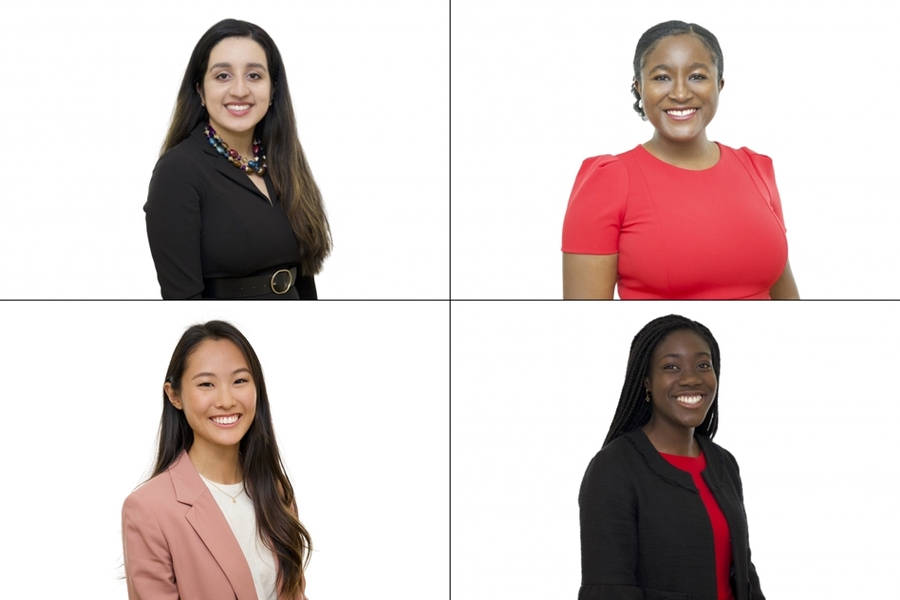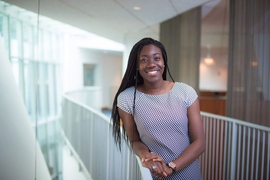Three MIT seniors, Mariam Dogar, Adedoyin Olateru-Olagbegi, and Jessica Quaye, and alumna Jessica Wang ’16, MEng ’17 are recipients of this year’s Schwarzman Scholarship distinguished fellowship. Another alumna was also awarded a scholarship but is waiting to make a public announcement until she has shared the news with her employer.
The five winners were selected from an applicant of pool over 4,700 candidates and will join fellow Schwarzman Scholars from around the world in China next August. Scholars complete a one-year master’s degree in global affairs at Beijing’s Tsinghua University. Their education is complemented by internships, career development mentors, high-profile speakers, and opportunities to travel throughout China.
Inspired by the Rhodes Scholarship, the Schwarzman Scholarship program began in 2015 to bring together talented young leaders and prepare them for the geopolitical and economic challenges of the 21st century by deepening their understanding of China. Since its inception, 18 MIT students and alumni have been named Schwarzman Scholars.
Kim Benard, assistant dean of distinguished fellowships in Career Advising and Professional Development prepares MIT’s applicants, with assistance from the Presidential Committee on Distinguished Fellowships’ faculty members. MIT students and recent alumni interested in learning more about the Schwarzman Scholarship program should contact fellowships@mit.edu.
Hailing from Northborough, Massachusetts, Mariam Dogar is majoring in biology and minoring in urban studies and planning. She aims to make health care more accessible and equitable through reworking outdated policies and utilizing technology. Dogar has worked at the World Bank developing telemedicine policy recommendations for lower middle-income countries. She has two years of experience on the teaching team of MIT’s negotiation and leadership classes, where she shaped pedagogy and co-taught a workshop for MBA students in Malaysia. She has taught humanitarian design in Greece with MIT D-Lab, worked in digital health care investing in the Middle East, and volunteered in refugee programs in Jordan. She is a co-president of MIT Mock Trial and GlobeMed@MIT. She is also an executive member of PaksMIT and counselor for Camp Kesem.
Jessica Quaye, an electrical engineering and computer science major, has conducted research with MIT.nano and the HCIE group in CSAIL. She has also sharpened her technical and business management skills through internships at Google, Microsoft, and Bain and Company. Quaye, a Tau Beta Pi Scholar, is president of the MIT African Students’ Association. She serves on MIT’s Undergraduate Association committees and the EECS Undergraduate Student Advisory Group. She founded the International Students of Color Working Group to support the needs of first-year international students, and she established the first MIT Global Teaching Lab initiative in Ghana. Quaye is from Accra, Ghana. As a Schwarzman Scholar, she hopes to deepen her understanding of public policy and dreams of one day driving policy change in Ghana.
Adedoyin Olateru-Olagbegi, from Hanover, Maryland, is majoring in computer science, economics, and data science. She envisions a world where quality health care is accessible to all, and plans to focus on health in developing countries with an emphasis on innovative digital tools. She has explored her interests in development and public health through classes that have taken her to South Africa and Colombia. As director of Camp Kesem at MIT, Olateru-Olagbegi organizes an annual summer camp for children affected by a parent’s cancer and oversees the MIT students who work with them. She has also held leadership roles with MIT Emergency Medical Services, the MIT Black Students’ Union, and Sigma Kappa Sorority, and has served on several MIT Institute Committees, including as a student advisor to President L. Rafael Reif.
Jessica Wang graduated from MIT in 2016 with a Bachelor of Science in computer science and engineering and received a Master of Engineering in 2017. She is passionate about utilizing technology for good and bringing her joint engineering and design background to shape technology policy. She currently lives in San Francisco, where she builds collaborative design software at Figma. She works on diversity and inclusion initiatives in the workplace and volunteers with Larkin Street, a nonprofit serving homeless youth, as a YCore Fellow. In the past, she’s worked at a machine learning startup, Facebook, and Uber. At MIT, Wang researched online sociopolitical discourse and misinformation, writing her thesis on digital systems to bridge ideological divides. She served as president of MIT Chinese Students’ Club and held leadership positions in MIT TechX and HackMIT.









